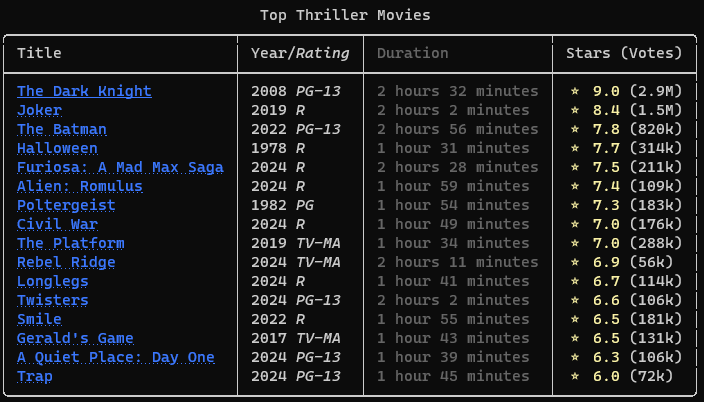TLDR: grab the source code or add it locally with
dotnet file add https://github.com/devlooped/catbag/blob/main/OpenAI/Chat/ChatClientTypedExtensions.cs .(leveraging dotnet-file).
Open AI recently introduced support for structured outputs in the API, and the final stable release of the .NET API for it released a mere 9 days ago has full support for leveraging that. By then, a post on X by David Fowler on a new JsonSchemaExporter made total sense (and I’m sure something official is coming down the pipe soon for the official SDK).
So I set out to try combining all things together in a simple extension method:
var client = new OpenAIClient(configuration["OpenAI:Key"]!);
var chat = client.GetChatClient("gpt-4o");
var movies = await chat.CompleteChatAsync<Movie[]>([
// message(s)
]);
The generic version of the existing CompleteChatAsync method should do the following
automatically:
- Use the new JsonSchemaExporter to generate a schema for the type
T - Cache the schema for future use
- Set the relevant option in the OpenAI API to use the schema
- Parse the response into the type
Tand return it. - If the type is an array/enumerable, wrap your T in a
Values<T>to workaround the OpenAI limitation that the schema root element must be an object (not an array).
View ChatClientTypedExtensions.cs
The code is fairly straightforward, with some things to note:
-
I add support for fetching the
[Description(...)]attribute from properties, since that can be helpful for the LLM to interpret how to parse a given property. This is done with aTransformSchemaNodecallback in theJsonSchemaExporterOptions:var node = JsonSchemaExporter.GetJsonSchemaAsNode(jsonOptions, typeof(T), new JsonSchemaExporterOptions { TreatNullObliviousAsNonNullable = true, TransformSchemaNode = (context, node) => { var description = context.PropertyInfo?.AttributeProvider?.GetCustomAttributes(typeof(DescriptionAttribute), false) .OfType<DescriptionAttribute>() .FirstOrDefault()?.Description; if (description != null) node["description"] = description; return node; }, }); -
The exporter allows passing a JsonSerializerOptions, and I found that requiring strict number handling works best:
static JsonSerializerOptions jsonOptions = new(JsonSerializerDefaults.Web) { TypeInfoResolver = new DefaultJsonTypeInfoResolver(), PropertyNameCaseInsensitive = true, PropertyNamingPolicy = JsonNamingPolicy.CamelCase, NumberHandling = System.Text.Json.Serialization.JsonNumberHandling.Strict, }; -
Since the OpenAI API requires the root element to be an object, I wrap the array in a
Values<T>class:public class Values<T> { public required T Data { get; set; } }I detect this at the beginning of the method by checking for an array element type or generic type parameter (for
IEnumerable<T>,List<T>, etc.) and adjust the code to use theValues<T>wrapper accordingly before returning the actualDatafor the requested type.
So let’s try this in a simple console app that scraps an IMDB list such as popular thriller movies rated 6+ with over 50k votes:
Let’s first see what we’ll render:

We’ll need a couple simple record classes to hold that movie info:
public record Movie(string Title, int Year, TimeSpan Duration, string AgeRating, StarsRating Stars, string Url);
public record StarsRating(double Stars, long Votes);
Then let’s set the console encoding plus collect the URL and we’ll just use a user secret for the OpenAI key:
Console.OutputEncoding = Encoding.UTF8;
var url = "https://www.imdb.com/chart/moviemeter/?ref_=nv_mv_mpm&genres=thriller&user_rating=6%2C&sort=user_rating%2Cdesc&num_votes=50000%2C";
// Allow passing the URL as an argument to the script
if (args.Length > 0)
url = args[0];
var configuration = new ConfigurationBuilder()
.AddUserSecrets(Assembly.GetExecutingAssembly())
.Build();
var client = new OpenAIClient(configuration["OpenAI:Key"] ?? throw new InvalidOperationException("Missing OpenAI key"));
var chat = client.GetChatClient("gpt-4o");
Web pages typically have a lot of stuff that we don’t really need for scraping, namely
the <head> section, styles and scripts, etc. I use my Devlooped.Web library that does that cleanup already by default for me:
using var http = new HttpClient();
http.DefaultRequestHeaders.AcceptLanguage.Add(new("en-US"));
var html = await http.GetStringAsync(url);
var body = HtmlDocument.Parse(html).CssSelectElement("body")!.ToString(SaveOptions.DisableFormatting);
Now for the actual typed chat invocation that will do the magic scraping and return the
a typed array of Movie objects from IMDB:
var movies = await chat.CompleteChatAsync<Movie[]>(
[
new SystemChatMessage(
"""
You are an HTML page scraper.
You use exclusively the data in the following HTML page to parse and return a list of movies.
You perform smart type conversion and parsing as needed to fit the result schema in JSON format.
"""),
new UserChatMessage(body),
]);
That’s literally ALL it takes. Now let’s render it nicely using Spectre.Console:
var table = new Table()
.Border(TableBorder.Rounded)
.Title("Top Thriller Movies")
.AddColumn("Title")
.AddColumn("Year/[italic]Rating[/]")
.AddColumn("[dim]Duration[/]")
.AddColumn("Stars (Votes)");
foreach (var movie in movies!)
{
table.AddRow(
$"[bold][blue][link={movie.Url}]{movie.Title}[/][/][/]",
$"{movie.Year} [italic]{movie.AgeRating}[/]",
$"[dim]{movie.Duration.Humanize(2, collectionSeparator: " ")}[/]",
$"[yellow]:star: {movie.Stars.Stars:0.0}[/] ({((double)movie.Stars.Votes).ToMetric()})");
}
AnsiConsole.Write(table);
Pretty mind-boggling what LLMs can do these days. Combined with a strong-typed API on top of the basic chat, this is becoming a very powerful tool for automating all sorts of tasks.
Enjoy!
/kzu dev↻d